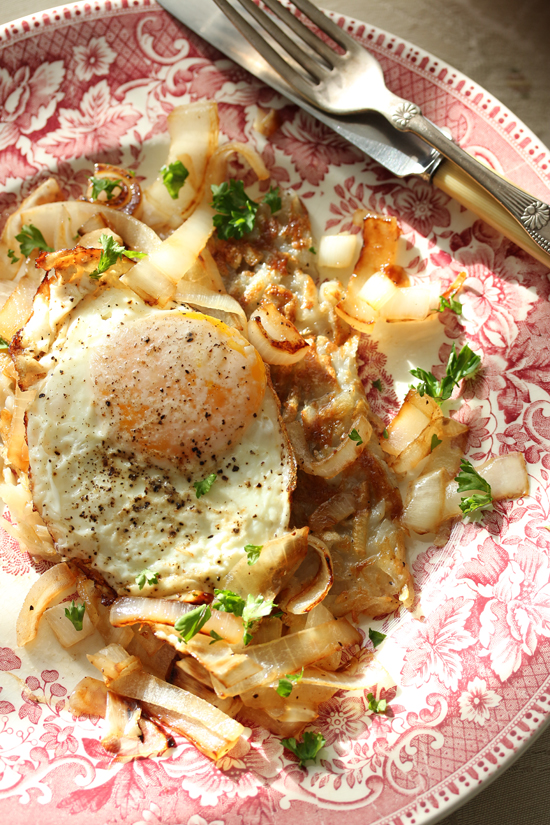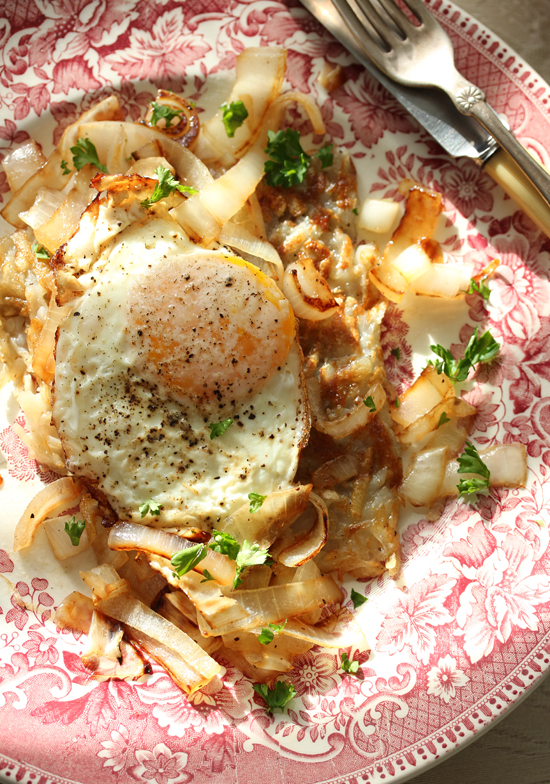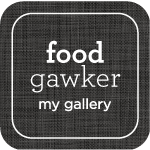
I whipped up this plate of food for lunch one day and had no intention of writing about or shooting it. I had served it on one of my plates I usually use as a prop, thinking this fanciness would make me feel just so special. Well, it looked so beautiful that I decided to take a photo, for fun, you know? So I started eating and as I was enjoying my food bling, my mind began wondering when this dish was first eaten. When were these ingredients first paired together, or at least, could have been. So I decided to do some research to see if I could figure it out.
The Egg. Which came first, the chicken or the egg? That is an easy one. Originally, 300 million years or so ago, all animals laid eggs. About 210 million YA mammals ancestors diverged from reptiles, dinosaurs and birds, but mammals didn’t stop laying eggs until about 120 million YA. Mammals were giving birth to live young, but no mammals were bigger than a cat and they were nocturnal, because dinosaurs were big daytime predators. Then, 65 million YA, all the non-avian dinosaurs died in that big extinction event, leaving a big space for those little mammals to fill and evolve. Around 5 million YA the first people, hominins, appeared and they ate eggs. Any bird and reptile eggs they could find. Eggs were great, because they didn’t have to be chased and killed. They didn’t have claws and teeth. So finally, one million years ago people made fire, and cooked those eggs in the coals. So good.
Homo Sapiens showed up about 200,000 years ago, and by 7500 BC, in China and India, we were keeping chickens, which we had domesticated from jungle fowl. And eating their eggs, of course. We figured out how to make pottery around 5000 BC, so we could boil water and make soft boiled eggs. By 800 BC, chicken eggs had reached Europe, although we had kept ducks and geese for their eggs before that.
Chickens and their eggs came to North America for the first time in 1493 on the 2nd voyage of Columbus and became the first domesticated fowl in the new world.
The Onion. Wild onions, resembling green onions and scallions, grew wild on every continent. Bulb onions, on the other hand, originated in Asia, Iran and Pakistan around 5500 years ago. They were growing in Chinese gardens 5000 YA and by 3500 BC, Egypt had organized onion cultivation. They spread throughout Europe and in 1620, bulb onions crossed the Atlantic on the Mayflower and were planted by the Pilgrim Fathers as soon as they could clear land.
Ok, we’ve got chicken eggs and bulb onions in North America by 1620, but we still couldn’t duplicate my dish, because potatoes wouldn’t be on the scene for another 100 years.
The Potato. Potatoes are native to Peru and the Inca Indians were the first to cultivate them somewhere between 8000-5000 BC. In 1536 the Spanish conquistadors conquered Peru and discovered the potato. But the potato did not travel a straight line north from South to North America. No, they took the scenic route through Europe, to Spain around 1570 and Sir Walter Raleigh brought them to Britain in 1589. Potatoes arrived in the American colonies in 1621 when the governor of Bermuda sent two chests of them to the governor of Virginia at Jamestown, who may have seen them as a novelty. However, they didn’t catch on. The first potato patches in the New World were planted in Londonderry, New Hampshire in 1719 by Scotch-Irish immigrants. Viola!
Therefore, I contend, my Egg.Onion.Potato dish could have been created in the autumn of 1719 in Londonderry, NH after the fall harvest.
P.S. There is no recipe for this simple dish. Fry an egg. Blacken a couple of onion slabs in butter. Flatten grated potato in a buttered skillet and cook until browned. Turn over. Brown. Put wedge on plate. Top with onions and egg. Salt and pepper. Eat. Enjoy.





![versatilebloggeraward[1]](https://cookandbemerry.com/wp-content/uploads/2010/09/versatilebloggeraward11.jpg)

{ 3 comments… read them below or add one }
I love the way your mind thinks. I think this is one of my favorite posts you have done so far. I love reading about where food originated and how and when it traveled the Western world. Fascinating.
This simple dish is absolutely beautiful and I see why it inspired such a great post!
I didn’t know most of this, but what surprised me the most was that the conquistadors didn’t bring the potatoes. Slackers!
My father would think this was THE single best plate of food ever created. (well…you’d have to add some steamed shrimp with Old Bay on there and one or two other things but you get the idea). My father thinks fried potatoes and onions are an especially incredible blessing from God. He could LIVE on them…..that is until about a week ago. My dad is diabetic (as are too many men in their 70s in the US) and while he tried to follow a diet for it to some degree, I think the past year or so he has REALLY gone off the rails. His sugar testing at the doctor’s office recently must have been something because he and my mom had a THREE HOUR appointment with a specialist about his diet and his sugar levels close to two weeks ago. A couple of years ago he followed a very strict diet a friend said he was following and my dad dropped at least 20 pounds and had to use almost no medication at all. And then…like many of us, the novelty wears off and you slowly slip back to the old ways. During that time though I almost fell off my chair at a holiday meal (usually at my home) when he turned down mashed potatoes. I almost had my mom verify that man sitting there WAS my dad this was so unusual. So when I saw this, I immediately thought of him and his LOVE of fried potatoes and onions – done in a cast iron skillet of course. And then, you top on that the farm fresh egg (done over easy so that wonderful yolk runs over it all), well you just can’t beat that. YUM….I’m making myself hungry. I think I might make this tomorrow. Maybe one day when my dad’s sugar level is in a much better place I’ll do this for him, as a treat. But until then, at least I can make it for me.